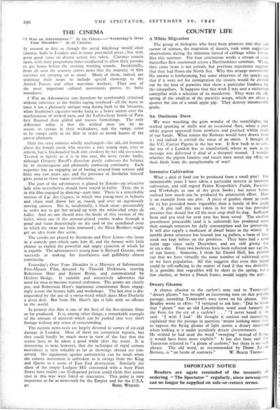THE CINEMA
"I Was an Adventuress." At the Odeon-"Yesterday's Over Your Shoulder." At all Cinemas.
IT seemed at first as though the aerial blitzkrieg would close cinemas both in London and in many provincial areas ; but with great good sense no drastic action was taken. Cinemas remain open, with their programme times readjusted to allow their patrons to• get home before the evening warning sounds. Incidentally, from all over the country comes news that the majority of film societies are carrying on as usual. Many of them, indeed, are widening their scope to include special showings to the Armed Forces and other war-time workers. Thus one of the most important cultural movements proves its basic soundness.
I Was an Adventuress can therefore be comfortably criticised without reference to the battles raging overhead—all the more so since it has a gloriously antique tang dating back to the 'twenties, when Stroheim's cigarette-smoke hung as a heavy screen over the machinations of wicked men, and the Lubitschean hotels of Paris first flaunted their gilded and rococo furnishings. The only difference today is that the wicked men are by no means so serious in their wickedness, and the vamps cease to be vamps early in the film in order to reveal hearts of the purest platinum.
Only the story remains wh011y unchanged—the old, old formula about the female crook who marries a nice young man, tries to reform, but is blackmailed back into crookery by her old associates. Treated as lightly as it is in this case, the story creaks badly, although Gregory Ratoff's direction partly redresses the balance by its inconsequent and pleasantly confusing continuity. Each sequence has an engaging air of having strayed from various odd films one saw years ago, and the presence of Stroheim himself gives point to these vague recollections.
The part of the adventuress is played by Zorina—an attractive lady who nevertheless should have stayed in ballet. True, she is in this film engaged in dancing—part time. There is a remarkable version of Lac des Cygnes, in which two young men in helmets and chain mail throw her at, round, and over an ingeniously moving camera. She is, incidentally, a black swan—presumably in order not to get her mixed up with the white-clad corps de ballet. And no one should miss the finale of this version of the ballet, when one of the armour-plated youths wades through a pond and leans despairingly on the roof of the castellated coop in which the swan nas been immured ; the Marx Brothers might get an idea from this scene.
The crooks are played by Stroheim and Peter Lorre—the latter in a comedy part which suits him ill, and the former with little chance to exploit the powerful and angry cynicism of which he is capable. The adventuress's young man is Richard Greene, who succeeds in making his trustfulness and gullibility almost convincing.
Yesterday's Over Your Shoulder is a Ministry of Information Five-Minute Film, directed by Thorold Dickinson, starring Robertson Hare and Ernest Bevin, and commentated by Herbert Hodge. It amiably and attractively advertises the need for men to become trained craftsmen. The points are clearly put, and Robertson Hare's ingenuous countenance floats engag- ingly across the lecture halls and workshops. The last shot is dis- tinguished by the use of a swear-word which dates Miss Doolittle a great deal. But from Mr. Hare's lips it falls with no offence in the world.
In general this film is one of the best of the five-minute films so far produced. It is, among other things, a remarkable example of the amount of material which can be packed into very short footage without any sense of overcrowding.
The current news-reels are largely devoted to scenes of air-raid damage in London. Most of them are competent reports, but they could hardly be much more in view of the fact that the scenes have to be taken a good while after the event. It is interesting to note, however, that the technique of rapid camera movement is very valuable as far as showings abroad are con- cerned. No arguments against authenticity can be made when the camera movement is unbroken as it swings from the King and Queen to a scene of East End destruction. Similarly the shots of the empty Ludgate Hill contrasted with a busy Fleet Street have reality ; no ill-disposed person could claim that scenes shot in this way were faked or inaccurate. This point is very important as far as news-reels for the Empire and for the U.S.A.


























 Previous page
Previous page